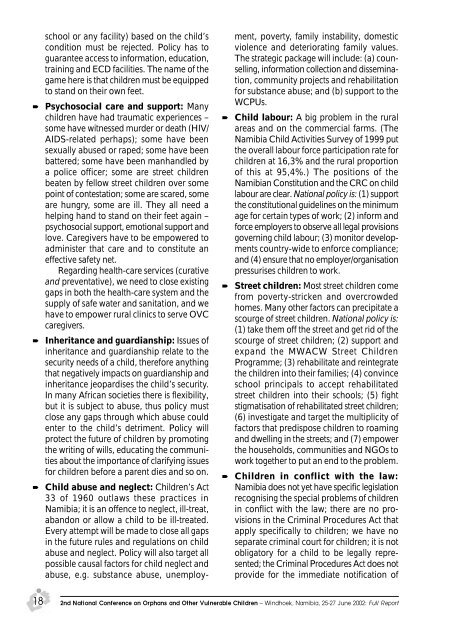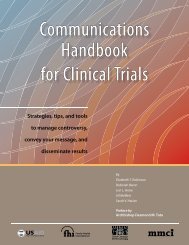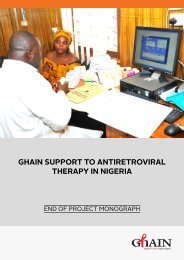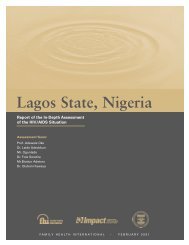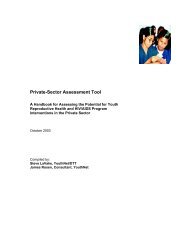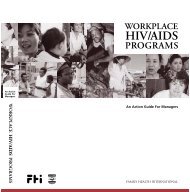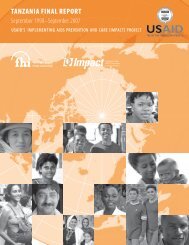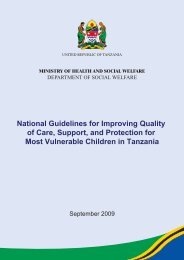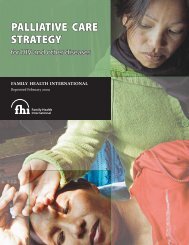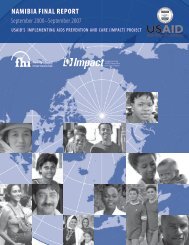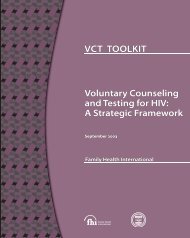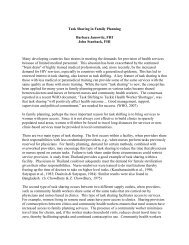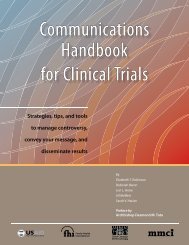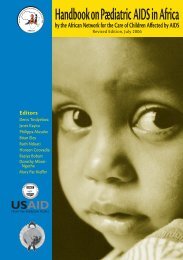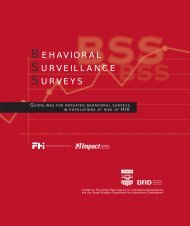2nd National Conference on Orphans and Other ... - FHI 360
2nd National Conference on Orphans and Other ... - FHI 360
2nd National Conference on Orphans and Other ... - FHI 360
Create successful ePaper yourself
Turn your PDF publications into a flip-book with our unique Google optimized e-Paper software.
school or any facility) based <strong>on</strong> the child’s<br />
c<strong>on</strong>diti<strong>on</strong> must be rejected. Policy has to<br />
guarantee access to informati<strong>on</strong>, educati<strong>on</strong>,<br />
training <strong>and</strong> ECD facilities. The name of the<br />
game here is that children must be equipped<br />
to st<strong>and</strong> <strong>on</strong> their own feet.<br />
Psychosocial care <strong>and</strong> support: Many<br />
children have had traumatic experiences –<br />
some have witnessed murder or death (HIV/<br />
AIDS-related perhaps); some have been<br />
sexually abused or raped; some have been<br />
battered; some have been manh<strong>and</strong>led by<br />
a police officer; some are street children<br />
beaten by fellow street children over some<br />
point of c<strong>on</strong>testati<strong>on</strong>; some are scared, some<br />
are hungry, some are ill. They all need a<br />
helping h<strong>and</strong> to st<strong>and</strong> <strong>on</strong> their feet again –<br />
psychosocial support, emoti<strong>on</strong>al support <strong>and</strong><br />
love. Caregivers have to be empowered to<br />
administer that care <strong>and</strong> to c<strong>on</strong>stitute an<br />
effective safety net.<br />
Regarding health-care services (curative<br />
<strong>and</strong> preventative), we need to close existing<br />
gaps in both the health-care system <strong>and</strong> the<br />
supply of safe water <strong>and</strong> sanitati<strong>on</strong>, <strong>and</strong> we<br />
have to empower rural clinics to serve OVC<br />
caregivers.<br />
Inheritance <strong>and</strong> guardianship: Issues of<br />
inheritance <strong>and</strong> guardianship relate to the<br />
security needs of a child, therefore anything<br />
that negatively impacts <strong>on</strong> guardianship <strong>and</strong><br />
inheritance jeopardises the child’s security.<br />
In many African societies there is flexibility,<br />
but it is subject to abuse, thus policy must<br />
close any gaps through which abuse could<br />
enter to the child’s detriment. Policy will<br />
protect the future of children by promoting<br />
the writing of wills, educating the communities<br />
about the importance of clarifying issues<br />
for children before a parent dies <strong>and</strong> so <strong>on</strong>.<br />
Child abuse <strong>and</strong> neglect: Children’s Act<br />
33 of 1960 outlaws these practices in<br />
Namibia; it is an offence to neglect, ill-treat,<br />
ab<strong>and</strong><strong>on</strong> or allow a child to be ill-treated.<br />
Every attempt will be made to close all gaps<br />
in the future rules <strong>and</strong> regulati<strong>on</strong>s <strong>on</strong> child<br />
abuse <strong>and</strong> neglect. Policy will also target all<br />
possible causal factors for child neglect <strong>and</strong><br />
abuse, e.g. substance abuse, unemploy-<br />
ment, poverty, family instability, domestic<br />
violence <strong>and</strong> deteriorating family values.<br />
The strategic package will include: (a) counselling,<br />
informati<strong>on</strong> collecti<strong>on</strong> <strong>and</strong> disseminati<strong>on</strong>,<br />
community projects <strong>and</strong> rehabilitati<strong>on</strong><br />
for substance abuse; <strong>and</strong> (b) support to the<br />
WCPUs.<br />
Child labour: A big problem in the rural<br />
areas <strong>and</strong> <strong>on</strong> the commercial farms. (The<br />
Namibia Child Activities Survey of 1999 put<br />
the overall labour force participati<strong>on</strong> rate for<br />
children at 16,3% <strong>and</strong> the rural proporti<strong>on</strong><br />
of this at 95,4%.) The positi<strong>on</strong>s of the<br />
Namibian C<strong>on</strong>stituti<strong>on</strong> <strong>and</strong> the CRC <strong>on</strong> child<br />
labour are clear. <str<strong>on</strong>g>Nati<strong>on</strong>al</str<strong>on</strong>g> policy is: (1) support<br />
the c<strong>on</strong>stituti<strong>on</strong>al guidelines <strong>on</strong> the minimum<br />
age for certain types of work; (2) inform <strong>and</strong><br />
force employers to observe all legal provisi<strong>on</strong>s<br />
governing child labour; (3) m<strong>on</strong>itor developments<br />
country-wide to enforce compliance;<br />
<strong>and</strong> (4) ensure that no employer/organisati<strong>on</strong><br />
pressurises children to work.<br />
Street children: Most street children come<br />
from poverty-stricken <strong>and</strong> overcrowded<br />
homes. Many other factors can precipitate a<br />
scourge of street children. <str<strong>on</strong>g>Nati<strong>on</strong>al</str<strong>on</strong>g> policy is:<br />
(1) take them off the street <strong>and</strong> get rid of the<br />
scourge of street children; (2) support <strong>and</strong><br />
exp<strong>and</strong> the MWACW Street Children<br />
Programme; (3) rehabilitate <strong>and</strong> reintegrate<br />
the children into their families; (4) c<strong>on</strong>vince<br />
school principals to accept rehabilitated<br />
street children into their schools; (5) fight<br />
stigmatisati<strong>on</strong> of rehabilitated street children;<br />
(6) investigate <strong>and</strong> target the multiplicity of<br />
factors that predispose children to roaming<br />
<strong>and</strong> dwelling in the streets; <strong>and</strong> (7) empower<br />
the households, communities <strong>and</strong> NGOs to<br />
work together to put an end to the problem.<br />
Children in c<strong>on</strong>flict with the law:<br />
Namibia does not yet have specific legislati<strong>on</strong><br />
recognising the special problems of children<br />
in c<strong>on</strong>flict with the law; there are no provisi<strong>on</strong>s<br />
in the Criminal Procedures Act that<br />
apply specifically to children; we have no<br />
separate criminal court for children; it is not<br />
obligatory for a child to be legally represented;<br />
the Criminal Procedures Act does not<br />
provide for the immediate notificati<strong>on</strong> of<br />
18 <str<strong>on</strong>g>2nd</str<strong>on</strong>g> <str<strong>on</strong>g>Nati<strong>on</strong>al</str<strong>on</strong>g> <str<strong>on</strong>g>C<strong>on</strong>ference</str<strong>on</strong>g> <strong>on</strong> <strong>Orphans</strong> <strong>and</strong> <strong>Other</strong> Vulnerable Children – Windhoek, Namibia, 25-27 June 2002: Full Report


